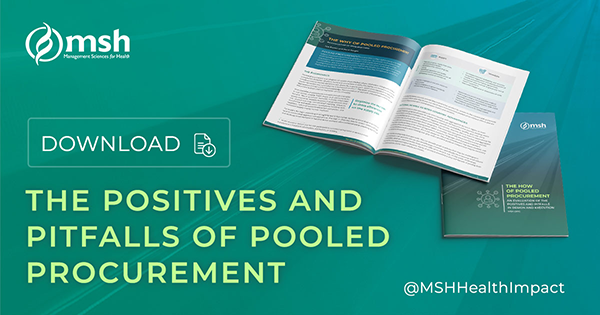Shaping 21st Century Health Supply Chains: The Positives and Pitfalls of Pooled Procurement
Shaping 21st Century Health Supply Chains: The Positives and Pitfalls of Pooled Procurement
Access to safe, effective, and affordable medicines and health commodities is driven in large part by the efficiency of a country’s procurement system. Without a well-planned procurement process, countries risk product and service quality, stockouts, costly emergency purchases, and over-purchasing.
On January 26th, MSH hosted a discussion on the role of pooled procurement mechanisms in strengthening supply chain management and advancing the availability of essential health products and services amidst complex challenges such as COVID-19.
This is the second in a series of forward-looking discussions with global experts on opportunities for reshaping health supply chains to make them more resilient and efficient.
Moderated by:
- Iain Barton, Senior Fellow at MSH and Founding Principal of Health4Development
Featuring:
- Muhammad Ali Pate, Julio Frenk Professor of the Practice of Public Health Leadership at the Harvard T. H. Chan School of Public Health and former Minister of Health of Nigeria; Global Director for Health, Nutrition and Population at the World Bank Group; and Director of the Global Financing Facility for Women, Children and Adolescents
- Tiwonge Mkandawire, Global Team Lead for Supply Chain at VillageReach and former Health Systems Strengthening Team Lead at USAID South Africa
- Vinod Guptan, Chief Executive Officer at MedSource Group Limited



